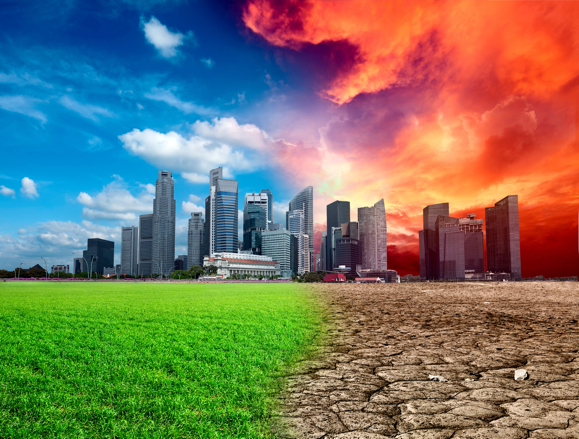The Earth’s climate is affected by many natural factors, such as the angle of the planet’s axis with respect to the sun, geological activity, oceans and greenhouse effect, in which the greenhouse gases (carbon dioxide, methane, water vapor, etc…) withhold incoming sunlight, thus creating a dynamic equilibrium that enables the creation and preservation of life.
Since the industrial revolution, the levels of carbon dioxide have increased by at least 30% due to the burning of fossil fuels and changes in land use (deforestation and urbanization).
The anthropogenic climate change process exacerbated the greenhouse effect, increasing the average global temperature by 0,6 +/- 0,2 degrees Celcius during the 20th century.
The phenomenon affects the natural environment: the polar ice-cap is melting and the sea level is increasing, extreme weather phenomena become more and more frequent, desertification and freshwater shortages take place and the planet’s ecosystems are under pressure which results in significant biodiversity loss, especially in terms of the rate of extinction of species.
Climate change entails material financial costs. According to the Stern Review (The Economics of Climate Change, 2006), the international community needs to take all necessary measures so as to maintain the average global temperature rise below the critical threshold of 2°C, otherwise the financial cost will be immense.
According to this study, cost of total inaction lies between 5% and 20% of the global GDP, which is disproportionately larger than the cost of tackling climate change, which fluctuates between 1% and 2% of the global GDP.
Climate change affects the economy, and it implies a series of risks for the business world.
Such risks entail impacts that will affect the smooth functioning of businesses in many ways.
Three basic climate-change risks are related to the business sector:
- Physical risk: pertains to the impact of intense natural phenomena incurring due to climate change (storms, floods, drought, hurricanes and forest fires).
- Regulatory risk: impacts stemming from the introduction of climate change policies (legal and regulatory frameworks, taxation and imposed operational procedures).
- Reputational risk: potential consequences from changes in the market conditions or any disruption of the relation between producers and consumers.
However, there are not only risks, but also opportunities that can be summarized as follows:
- Opportunity from the direct impacts of climate change: Local changes in the climate may be a problem for certain areas, while for others, it may comprise a business opportunity.
- Regulatory opportunity: Climate change boots innovation (climate-neutral products and services) and employment, and enhance the business cycle and profitability.
- Market opportunity: Responding to an ever increasing environmentally aware consumer demand makes business sense, and it is a strategy for ‘green’ image-making.
Risk exposure and arising opportunities are related not only to sectoral parameters, but also to the geographic location and dispersion of each organization.
For instance, the tourism and agricultural sectors face the greatest physical risk, whilst industrial companies face significant risks from a changing regulatory framework.
Yet, climate change for both those sectors constitutes also an opportunity.
The agricultural sector may reap benefits from developing environmentally-friendly crops, while tourism may enjoy increased revenues from altering its business model in order to address environmentally sensitive individuals from across the world.
Climate change does not only concern large companies and multinationals, but also the smaller ones. In Europe Small-medium enterprises (SME’s) are the pillars of the national economies.
This implies a significant environmental footprint that requires long-term, effective planning.
Both at local and global level, climate change is an opportunity for redesigning businesses and developing innovative products and processes.
International developments strongly suggest that responsible entrepreneurship is inextricably linked with environmental responsibility, and this applies also to smaller companies.
European SMEs can only remain competitive, up-to-date and sustainable when they are equipped with the necessary knowledge to face the environmental challenges of our times.
Information Source: European Commission, DG Environment.
We help our clients and partners address the most pressing economical, political, social and environmental challenges. If you want to learn more about our sustainability practices, please Contact Us for an initial introductory consultation to discuss what management and communications systems you may need for complete sustainability legislative and regulatory compliance, and better measurement and reporting of TBL performance.








Leave A Comment
You must be logged in to post a comment.